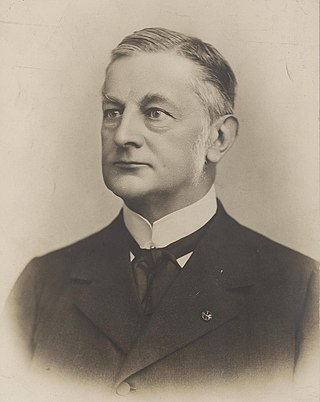
The Netherlands is a parliamentary representative democracy. A constitutional monarchy, the country is organised as a decentralised unitary state. The Netherlands can be described as a consociational state. Dutch politics and governance are characterised by a common striving for broad consensus on important issues, within both of the political community and society as a whole.
The Christian Union is a Christian democratic political party in the Netherlands. The CU is a centrist party, maintaining more progressive stances on economic, immigration and environmental issues while holding more socially conservative positions on issues such as abortion and euthanasia. The party describes itself as "social Christian".

The Reformed Political Party is a conservative Reformed Christian political party in the Netherlands. The SGP is the oldest political party in the Netherlands existing in its present form, and has been in opposition for its entire existence. Since 1925, it has won between 1.5% and 2.5% of the votes in general elections. Owing to its orthodox political ideals and its traditional role in the opposition, the party is considered a testimonial party.

The Christian Democratic Appeal is a Christian democratic and conservative political party in the Netherlands.

The Anti-Revolutionary Party was a Protestant conservative and Christian democratic political party in the Netherlands. The party was founded in 1879 by Abraham Kuyper, a neo-Calvinist theologian and minister who served as Prime Minister between 1901 and 1905. In 1980 the party merged with the Catholic People's Party (KVP) and the Christian Historical Union (CHU) to form the Christian Democratic Appeal (CDA).

The Catholic People's Party was a Catholic Christian democratic political party in the Netherlands. The party was founded in 1945 as a continuation of the interwar Roman Catholic State Party, which was in turn a successor of the General League of Roman Catholic Caucuses. The party was in government throughout its existence. In 1977, a federation of parties including the Catholic People's Party, the Anti-Revolutionary Party (ARP) and the Christian Historical Union (CHU) ran together under the Christian Democratic Appeal (CDA) banner. The three participating parties formally dissolved to form the CDA in 1980.

General elections were held in the Netherlands on 3 July 1918. They were the first elections held after a series of reforms that introduced universal male suffrage and pure proportional representation, replacing the previous two-round system in single member constituencies. This change was known as the Pacification of 1917, which also included the introduction of state financing of religious schools, and led to the start of consociational democracy.
Liberalism in the Netherlands started as an anti-monarchical effort spearheaded by the Dutch statesman Thorbecke, who almost single-handedly wrote the 1848 Constitution of the Netherlands that turned the country into a constitutional monarchy.

The Free-thinking Democratic League was a progressive liberal political party in the Netherlands. Established in 1901, it played a relatively large role in Dutch politics, supplying one Prime Minister, Wim Schermerhorn. The League is a predecessor of two of the major Dutch political parties, the conservative liberal People's Party for Freedom and Democracy (VVD) and the social democratic Labour Party (PvdA). The social liberal Democrats 66 also claims that it and the VDB are ideologically connected.

General elections were held in the Netherlands on 5 July 1922. They were the first elections held under universal suffrage, which became reality after the acceptance of a proposal by Henri Marchant in 1919 that gave women full voting rights. Almost all major parties had a woman elected. The number of female representatives increased from one to seven. Only the Anti-Revolutionary Party principally excluded women from the House of Representatives. Another amendment to the electoral law increased the electoral threshold from 0.5% to 0.75%, after six parties had won seats with less than 0.75% of the vote in the previous elections.

The Christian Historical Union was a Protestant Christian democratic political party in the Netherlands. The CHU is one of the predecessors of the Christian Democratic Appeal (CDA), into which it merged in September 1980.

The Communist Party of the Netherlands was a communist party in the Netherlands. The party was founded in 1909 as the Social Democratic Party (SDP) and merged with the Pacifist Socialist Party, the Political Party of Radicals and the Evangelical People's Party in 1991, forming the GroenLinks. Members opposed to the merger founded the New Communist Party of the Netherlands.

The Political Party of Radicals was a Christian-radical and green political party in the Netherlands. The PPR played a relatively small role in Dutch politics and merged with other left-wing parties to form GroenLinks in 1991.

The first Van Agt cabinet, also called the Van Agt–Wiegel cabinet was the executive branch of the Dutch Government from 19 December 1977 until 11 September 1981. The cabinet was formed by the christian-democratic Christian Democratic Appeal (CDA) and the conservative-liberal People's Party for Freedom and Democracy (VVD) after the election of 1977. The cabinet was a centre-right coalition and had a slim majority in the House of Representatives with Christian Democratic Leader Dries van Agt serving as Prime Minister. Liberal Leader Hans Wiegel served as Deputy Prime Minister and Minister of the Interior.

The Social Democratic Workers' Party was a Dutch socialist political party existing from 1894 to 1946. Originating from a split in the prior Social Democratic League, the party was a predecessor of the current social democratic Labour Party (Netherlands).

The Social Democratic League was a socialist political party in the Netherlands. Founded in 1881, the SDB was the first socialist party to enter the House of Representatives.
The Christian Social Party was a Christian socialist political party in the Netherlands. The CSP played a minor role in Dutch politics and is historically linked to the Labour Party.

This article gives an overview of Christian democracy in the Netherlands, which is also called confessionalism, including political Catholicism and Protestantism.

Jhr. Alexander Frederik de Savornin Lohman was a Dutch politician and leader of the Christian Historical Union during the first quarter of the 20th century.













